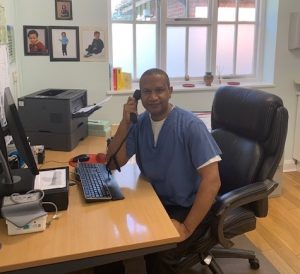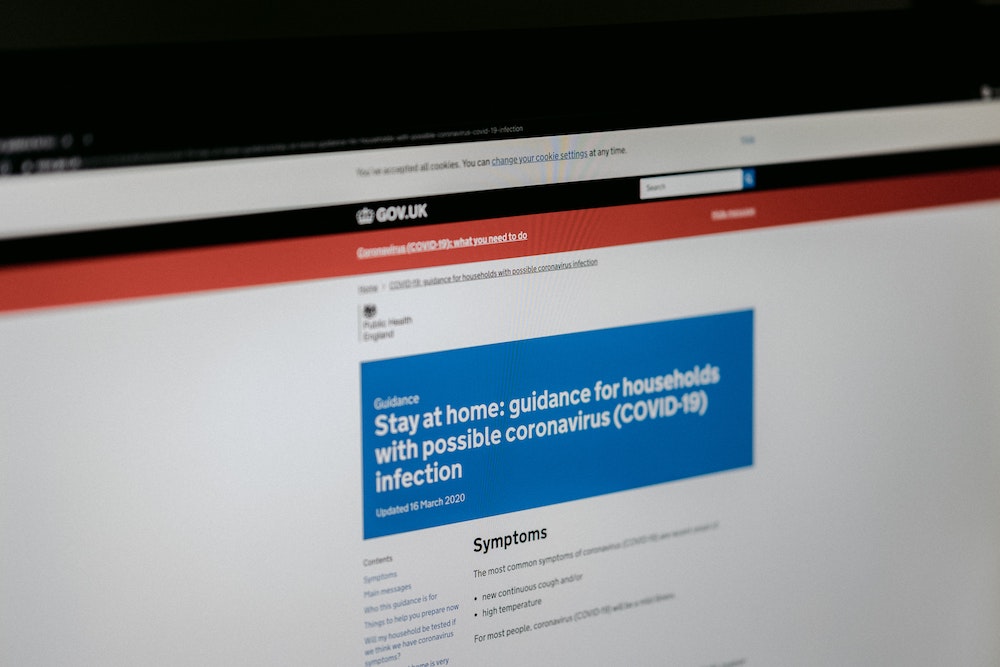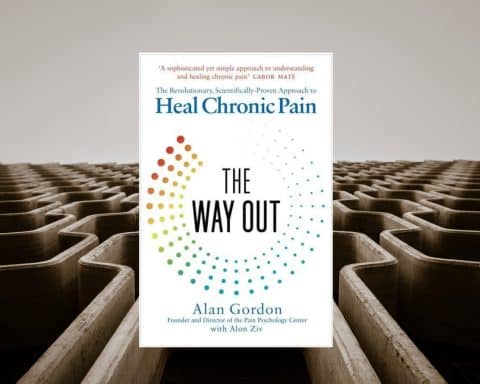 Joe Jones is a GP principal and Trainer in Edgware at the Penhurst Gardens Surgery.
Joe Jones is a GP principal and Trainer in Edgware at the Penhurst Gardens Surgery.
[wp_time_to_read]
In this stressful climate of fear, uncertainty, challenge, survival, and a sense of being overwhelmed or stretched to the limit, GPs and mental health professionals need novel approaches to help them explain the complex plethora of feelings, symptoms and behaviours resulting from the COVID-19 earthquake.
Rather than re-invent the wheel, the GPs at Penshurst Gardens Surgery are utilising the established Kübler-Ross stages of grief° in an innovative way to help diagnose COVID mental health problems and explore the available options to guide personalised, compassionate care.
COVID ‘grief’ stages based on the Kübler-Ross model:
1. COVID Denial. The myths: “It’s an impeachment hoax!”. Or: “I am young, so COVID will not affect me and the mask that I am wearing will protect me, therefore is it really necessary to wash my hands?”
2. COVID Anger. Lockdown measures may increase anxiety, provoke anger and ignite civil disobedience: “Why are my doctor colleagues still not being provided with adequate PPE to protect them from this deadly virus that scares the hell out of me?” Or: “My liberties are slowly being taken away. Why can I not go to pubs and clubs anymore or walk my dog in the park?”
3. COVID Bargaining. “Can I travel abroad to Antarctica or a country free of COVID-19? Or maybe my second home?”
4. COVID Depression. Vulnerable elderly and COVID-19 high risk groups are most at risk of loneliness/isolation from social distancing and shielding. But so are the chronically mentally-ill already at risk of suicide or recently-bereaved by the tragic loss of loved ones to COVID-19 and other patients with learning difficulties or disabilities.
5. COVID Acceptance. “We are all in this fight together so I will comply with the lockdown measures and do anything to reduce disease transmission and help humanity to survive this plague”.
As previously described by Kübler-Ross, we can expect our patients to move up and down the various stages in a fluid manner until they finally reach acceptance.
Practitioners should also be alert to the possibility that they too may be suffering from COVID grief from patient transference of emotions/feelings and take appropriate steps to debrief, discuss traumatic cases with colleagues or if necessary seek professional help for themselves. Self-awareness, critical reflection/or feedback from supportive colleagues are very helpful at a time when clinicians may themselves be in COVID Denial and hold on to their stoic mantra of ‘physician heal thyself ‘.
Penshurst prescriptions for the COVID ‘grief’ stages:
1. COVID Denial. Public/patient education should be tailored to the underlying health beliefs of COVID deniers, however GPs should be mindful not to provoke COVID anger when challenging such beliefs but to understand that denial in itself may be the patient’s only coping strategy.
2. COVID Anger. Allow enough time for listening, empathy, counselling in your telephone consultations and offer the option of referral for anger management if appropriate.
3. COVID Bargaining. Acknowledge where the patient is in their grief and provide reassurance that is normal to flit back and forth between the stages.
4. COVID Depression. Patients may benefit from bereavement support/ or counselling. Mindfulness therapy and CBT may be required to break the vicious cycle of negative thoughts/anxiety and avoidance behaviour (eg. social isolation) and help promote resilience. Consider psychotropic medications and adult psychiatry or CAMHS referral if and when appropriate.
5. COVID Acceptance. Regularly reinforce the benefits of compliance for ‘the greater good’ in saving the lives of the vulnerable and use motivational interviewing to empower the patient to carry on with their normal lives.
We at Penshurst hope that by applying the Kübler-Ross model in your consultations relating to COVID-19, this simple tool may provide deeper insights/understanding of where the patient is in their grief and guide appropriate mental health support at this very difficult, unusual and challenging time for families and communities.
Reference:
On Death and Dying. Elisabeth Kübler-Ross. New York: The Macmillan Company (1969)







I really appreciated this article and approach as did everyone in the practice. Thank you so much Dr Jones for thhis innovative approach!
Very important to know and recognise that COVID Denial may be used subconsciously as a ‘coping mechanism’ in the early stages of COVID ‘Grief’.
However with the emergence of the highly infectious new variant UK strain, reversion to isolation/shielding and school closures and three competing vaccines (Pfizer, Oxford, Moderna), we should expect a plethora of reactions that need to recognised, categorised, and managed with skill and sensitivity eg. COVID Anger from loss of civil liberties during lockdown/bereavement/job losses, COVID Bargaining from Vaccine Hesitancy at one end of the spectrum to mounting vaccination queries/confusion about prioritisation and assignment of the COVID priority groups at the other.
Public Health Education (PHE) is key to moving everyone towards COVID/Vaccine Acceptance and the goal of herd immunity through global vaccination.
The Penshurst Prescriptions remain Relevant to this day.
Human reactions are the same in all stressful life events and crises eg. bereavement, pandemics, burnout, the NHS Workforce crisis
The Penshurst Prescriptions can help people and healthcare professionals recognise and manage them with calmness and confidence.
With Burnout triggered by pandemic situation, the Doctor becomes the Patient but is most likely to Deny burnout as a way of coping.
The prescribed treatment for Denial is Public/Patient Education (which is what we are doing here at this time) but we need to Educate the public that we are human too!
We also need to better manage Anger in patients (eg. not having unlimited resources/workforce to see everyone face to face) and cope with ever increasing demand, complexity or difficult conversations as Bargaining situations arise (eg. Polio immunisations, COVID boosters, the NHS waiting list/backlog etc).
Ultimately we need to reach Acceptance that DOCTORS are HUMAN and need to make TIME to care themselves (Self Care) and families so that they are re-energised and better able to Care for their patients.
Peer comments from July 2020:
Wow that’s amazing. Great work and a great read (Mr Daren Francis, Consultant Colorectal Surgeon, Royal Free hospital)
A fantastic article to help patients and carers. Please share COVID ‘GRIEF’: RECOGNISING AND MANAGING REACTIONS TO CORONAVIRUS by Joseph Jones (Prof Hiten Patel, Editor in Chief WJCO, Consultant Urologist, St George’s Hospital)
That would be really usefully disseminated in secondary care as well (Dr Matthew Adler, Consultant Rheumatologist, Frimley Park hospital)
Thanks, Joe. Great article! (Dr Huma Vohra, GP Appraiser, Patch Associate Dean Northeast and Central London)
Dear Joe. Congratulations on getting your article published. I found it very easy to read and will definately recommend it as a tool for my staff to follow in these difficult times. I will pass on your article to all my colleagues as im sure they will find it very useful tool to use. Congrats again Joe. Hope to see you all soon. Margaret (Margaret Macdonald, Senior District Nurse, CLCH)
Just read your article. Well done for getting it published. What I find more amazing is that you have had time to write an article in this very busy pandemic response… (Dr Anita Patel, Senior GP partner, St Andrews Medical Centre; Programme Director, Barnet GP Speciality Training Scheme)
Well done Joe. A very well written article. (Dr Melissa Holz, GP partner, Penshurst Gardens Surgery)
Well written concise article! Photo suits the changing face of gp consultations (Dr Shagufta Herwitker, GP partner, Penshurst Gardens Surgery)
This is legendary!! So excited and inspired to read! (Dr Anu Parihar, GP on Retainer Scheme at Penshurst Gardens Surgery)
Great article Joe Very proud to read this
And have shared with all my family and friends (Tini Patel, Health Care Assistant, Penshurst Gardens Surgery)
Congratulations on the publication Joe.
(Dr Betty Doegah, MBA, Dental Surgeon NHS, Business Analyst and Wellbeing Manager at Penshurst Gardens Surgery)
Well done Joe! Good to know we have a lot of talented and dedicated people in our PCN (Dr Daniela Amasanti-DeBono, GP Partner, Millway Medical Group)
Well done – a succinct article setting out what to expect in our patients and likely ourselves with approaches to take (Dr David Reuben, GP partner, Langstone Way Surgery)
Excellent, well-written article. Totally relevant and on point. (Dr Natalie Hope, Orthopedic Registrar, Kings hospital)
Well done Joe, quite straight forward, will spread to my colleagues (Dr Gaspar Da Silva, Sleaford Medical Group)
Very nice article Joe! I am sure your peers will benefit much from this model. thanks for sharing with me too. (Cheryl Fernandes, former Deputy Practice Manager, Penshurst Gardens Surgery)
Your article will help so many people. l will share with all my friends around the world (Mr Freddy Blell, family friend)
Love it! Keep up the good work Brother Joe. Stay safe and God bless!!🙏🏾 (Dr Yasmin Kandeh, my sister in USA)
)
Great to hear the article is getting good reactions, it’s a lovely piece.
With very best wishes,
Euan
> Dr Euan Lawson FRCGP
> Deputy Editor
> British Journal of General Practice & BJGP Open
👍👍👍Keep the flag flying (Mr Ulric O.E Jones , Consultant Neurosurgeon (aka Dad) who died from COVID on 9.9.2020 serving in the line of duty and whose blessed memory will never be forgotten. Rest in perfect Peace 🙏🏾🙏🏾🙏🏾